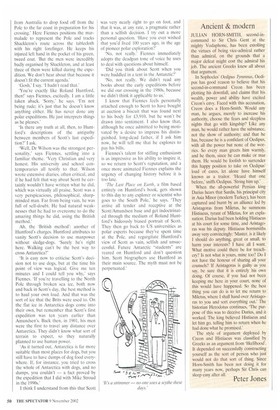Ancient & modern
JULIAN HORN-SMITH, second-incommand to Sir Chris Gent at the mighty Vodaphone, has been extolling the virtues of being vice-admiral rather than admiral, on the grounds that a major defeat might cost the admiral his job. The ancient Greeks knew all about that argument.
In Sophocles' Oedipus Tyrannus, Oedipus has good reason to believe that his second-in-command Creon has been plotting his downfall, and claims that his wealth, power and ability have excited Creon's envy. Faced with this accusation, Creon does a Horn-Smith. Would any man, he argues, merely to increase his authority, choose the fears and sleepless nights that go with kingship? Like any man, he would rather have the substance, not the show of authority; and that he has, because he is a confidant of Oedipus, with all the power but none of the worries. So every man greets him warmly, and he them, since he can make or mar them. He would be foolish to surrender this happy position to take on Oedipus' load of cares, let alone have himself known as a traitor. 'Heard that one before,' sniffs Oedipus. 'String him up.'
When the all-powerful Persian king Darius hears that Sardis, his principal city in Asia Minor (modem Turkey), has been captured and burnt by an alliance led by Aristagoras from Miletus, he summons Histiaeus, tyrant of Miletus, for an explanation. Darius had been holding Histiaeus at his court for some time, and Aristagoras was his deputy. Histiaeus homsmiths away very convincingly: 'Master, is it likely I should do anything, great or small, to harm your interests? I have all I want. What motive could there be for treachery? Is not what is yours, mine too? Do I not have the honour of sharing all your counsels? If Aristagoras is guilty as you say, be sure that it is entirely his own doing. Of course, if you had not been keeping me here in your court, none of this would have happened. So the best thing you can do is to let me return to Miletus, where I shall hand over Aristagoras to you and sort everything out.' The historian Henx1otus continues, 'The purpose of this was to deceive Darius, and it worked. The king believed Histiaeus and let him go, telling him to return when he had done what he promised.'
The style of argument deployed by Creon and Histiaeus was classified by Greeks as an argument from 'likelihood'. It depended on successfully constructing yourself as the sort of person who just would not do that sort of thing. Since Horn-Smith has been not doing it for many years now, perhaps Sir Chris can
sleep easy after all. Peter Jones


















































































































 Previous page
Previous page